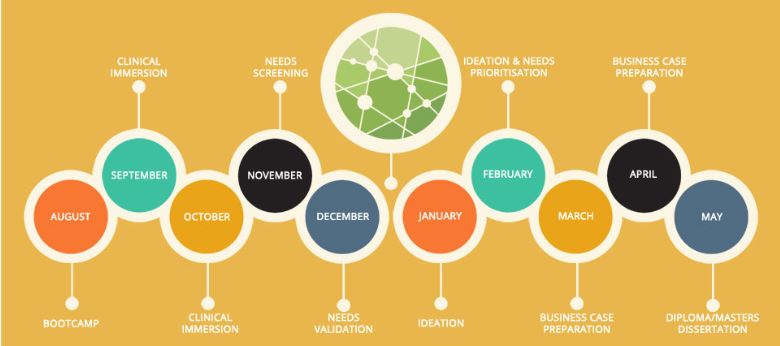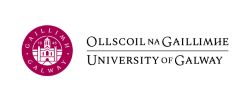Programme Overview
BioInnovate is a 10-month, full-time MedTech and digital health innovation training programme which focuses on a proven needs-led innovation process for identifying, inventing, and implementing new health technologies. The process, first established at Stanford University, involves three key steps – Identify, Invent, Implement. BioInnovate participants are expertly guided through these steps with mentorship from academic, industry and clinical expertise.
At the start of the programme, participants are brought together in multidisciplinary teams, so that each team has clinical, technical and commercial experience. Each team is then assigned a specific clinical area to focus on. For the duration of the programme, teams then work together to discover, filter and validate (Identify) unmet healthcare needs, define the value proposition for solving the need, de-risk the business idea, (Invent) and design a strategy for commercialisation (Implement). For a more detailed understanding of how this works, read our Programme Monthly Breakdown below.
Programme Mentors
BioInnovate participants have access to expert mentoring throughout the programme to support them on their BioInnovation journey. Our mentors are domain experts who understand all aspects of the programme and have lived experience in health technology innovation.
Programme Monthly Breakdown
The programme is exciting, action-packed and intensive from day one. Explore this monthly breakdown of the programme below:

August: Bootcamp
The BioInnovate programme kicks off in August with an intensive "Bootcamp" designed to immerse the teams in the year’s clinical focus areas and introduce them to the BioInnovate innovation process. During this fast-paced experience, BioInnovate Teams engage in a Biodesign Sprint that accelerates their understanding of the process and prepares them for the challenges ahead. In Bootcamp, students interact with leading health technology experts, begin forming strong connections with their teammates, and familiarise themselves with the Galway MedTech ecosystem, — all while laying the groundwork for a collaborative and rewarding journey in innovation.
Identify
September & October: Clinical Immersion
The months of September and October are dedicated to the Clinical Immersion stage of the BioInnovate programme, a critical part of the "Identify" phase in the Biodesign innovation process. During this time, participants work closely with healthcare providers, shadowing physicians, patients, and clinical staff across a variety of care settings including clinics, operating rooms, procedure labs, and intensive care units. Throughout this immersive experience, teams are tasked with identifying unmet or under-addressed clinical needs by mapping their observations and engaging with global experts via virtual interviews. By the end of Clinical Immersion, participants will have identified and documented hundreds of potential healthcare challenges, laying the foundation for innovation in the next stages of the BioInnovate journey.
November & December: Filtering
In November, students begin the crucial process of narrowing down the hundreds of clinical needs identified during Clinical Immersion. This stage is about refining and prioritising the most pressing, impactful problems, honing their focus on the most promising opportunities.
Invent
January & February: Brainstorming
In the new year, the programme shifts to the Invent phase of the Biodesign process, where teams begin creatively brainstorming potential solutions to the clinical problems they've identified. They consider all aspects of bringing a new technology to market, including; Product design development, Clinical trials strategy, Regulations and reimbursement. Teams work to ensure that their identified Needs align with regulatory requirements and are positioned for financial viability within healthcare systems.
By January, participants also must choose which associated post-graduate award they would like to pursue; the Post Graduate Diploma (PG Dip BioInnovation) or the Research Masters (MSc Innovation).
Implement
March & April: Business Case Preparation
March marks the beginning of the Implement phase of the Biodesign process, where participants focus on the commercial aspects of bringing their innovations to market. They develop essential business skills, including business planning, fundraising, and strategies for scaling their solutions. The aim is to prepare participants for the commercial realities of launching a MedTech product, ensuring they are equipped to attract investment and build sustainable businesses.
May: Final Pitches and Diploma Submission
The programme culminates in May, when participants prepare and deliver their final pitches, presenting their fully developed innovations to a panel of industry experts, investors, and healthcare leaders. This is a pivotal moment, where teams showcase all they have learned and achieved over the year. Participants who opt for the PG Dip BioInnovation, submit their diploma projects alongside their pitches, marking their formal completion of the BioInnovate Programme.
August: Research Dissertation Submission
Participants who opt for the MSc Innovation have until August to submit their research dissertation which marks their formal completion of the BioInnovate Programme.

